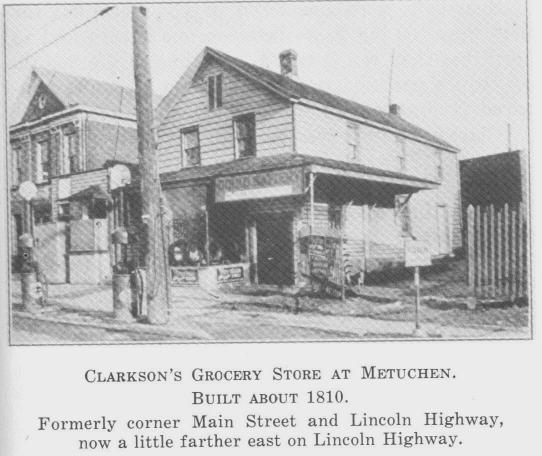
Metuchen Edison History Features
Recollections of
Boyhood Days
In Old Metuchen
By
David Trumbull Marshall
Published by The Case Publishing Co., Flushing NY 1930
(Second Edition)- (c) 1930
Clarkson's Store.
Clarkson's grocery store used to stand on the corner of Main Street and the Middlesex and Essex Turnpike.

When I was a boy I used to have to go there for groceries and sometimes took a squat brown gallon jug for molasses.
There was a clerk there by the name of Jep. I never rightly knew his last name.
Jep was tall and dark and used to excite my admiration by the way he could fill a molasses jug.
He set the jug on the floor and standing above it, used to aim over the edge of the gallon measure and pour the molasses in a thin stream into the mouth of the jug without using a funnel.
I tried that trick a couple of times.
I got some of the molasses into the jug.
At Clarkson's store they sold pretty much everything from salt mackerel to paper collars.
In the backroom were the usual assortment of kerosene barrels, salt mackerel barrels, molasses barrels and dried salt codfish, each vying with the other for supremacy in odors.
Barring the old-fashioned yellow kerosene with its villainous odor, the combination of salt codfish and ham and salt mackerel, made to my boyish taste a very pleasing odor.
In the body of the store there were barrels of brown sugar and soda crackers.
The brown sugar was dispensed wrapped in coarse brown paper and while the sugar was being wrapped a fellow could swipe a lump, not like now, when the sugar comes done up in a tight box.
I think the soda crackers which came in a barrel and were made by Brinkerhoff of Newark, N. J., had a better taste than any I get now.
When the crackers were wrapped a boy had a chance to lift one or two - no inner seal packages in those days.
How I did love the old-fashioned loaves of bread !
The loaves were baked in blocks and as one loaf was broken from the block there was a big surface of flaky bread from which a boy could peel off quite a lot without its being missed much.
The soda crackers from a fresh barrel certainly were crisp and snappy, but later when they had been subjected to the prolonged treatment with tobacco smoke from the crowd that used to "set" around the old pot-stove they were not so good.
When by good fortune I could get my hands on a penny I could buy sour-balls or Jujube paste fishes.
Sour-balls were considered an economical buy for they were too big to go between one's teeth and so hard that they would last a long time in the mouth.
Jujube paste particularly, when a bit stale, compared favorably with rubber for lasting qualities.
Clarkson's store was built shortly after the Middlesex and Essex Turnpike was put through, about 1810.
Some time about 1890 the building was moved a little east of its old location on the corner.
The house in which Mr. Clarkson lived stood on the northwest corner of Main Street and Middlesex Turnpike, or as it is now, the Lincoln Highway.
The house was built about the time the old Presbyterian Church in the old cemetery was torn down in 1835, for some of the church timbers went into the making of the house.
DITTO
Back in the 1860's there were two brothers living in Menlo Park by the name of Ellis and Chris John. They used to come to Metuchen and buy their groceries at Clarkson's Store. At that time most people had charge accounts and had a book that they took to the store with them in which all of their purchases were written down. One day when the brothers had bought some groceries and were on their way home, Chris John got out the grocery book to check up on their purchases.
When he opened the book he saw "ditto" written there. Turning to his brother, he said, "Ellis, what's ditto?"
"I don't know, Chris John; we never bought no ditto."
"Well, turn around, Ellis, we'll go back and find out."
So they went back to the store and Chris John said to the clerk, Joe Dietche, "What's ditto? We didn't buy no ditto."
So Joe explained to him: "The last time you were here you bought a pound of coffee, and today you bought a pound of coffee. Well, instead of writing one pound of coffee down again, I just put down ditto, which means the same."
"Oh !" says Chris John and walked out and got in the wagon. "Turn around, Ellis, and drive home," said Chris John.
Ellis turned to his brother, "Chris John, did you find out what ditto was?" Chris John didn't say anything. Ellis asked him again, "Chris John, did you find out what ditto was?" Still no answer. Pretty soon he asked him again, "Chris John, did you find out what ditto was?"
"Yes. It means that I'm one darn fool and you're another."
Boyhood Days in Old Metuchen Title page
Metuchen Edison History Features index page
Metuchen Edison Historical Society page
Lasted updated 5/13/99 by Jim Halpin.